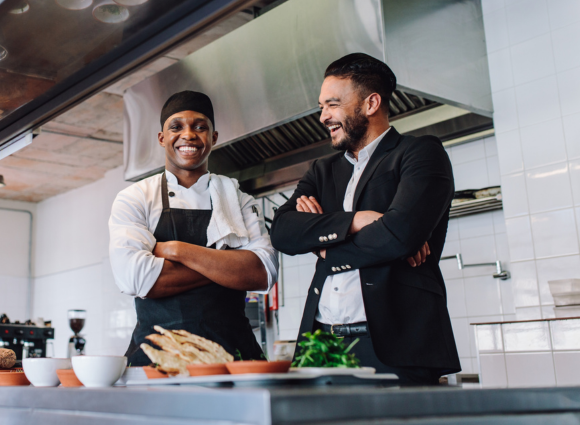
How can you make sure your food delivery service doesn’t take out your restaurant?
Chances are, if you own or operate a restaurant, deciding on the best food delivery service can make or break your bottom line. And with the on-demand consumer mentality, it’s important you understand the potential liability issues before you sign a contract with a third-party delivery service.
Spencer Duvall, Vice President, Office of the President and CEO, and Josh Miller, Vice President Food & Beverage Practice, of Kansas City-based Lockton Companies, talked to us about the potential risk and rewards restaurant owners need to think about when deciding whether to keep delivery service in-house or use a third-party service.
Mize Houser: “What things should an owner consider when looking at providing their own delivery service or using a third-party service like Grub Hub, Door Dash, Uber Eats and others?”
Spencer: “If you hire your own delivery team, you have more control over the delivery of your product, maintaining food product quality and managing liability. We also advise clients to develop a formal fleet safety program that includes reviewing the employee’s motor vehicle records to identify any potential problems. If you require an employee to use his or her own vehicle, understand and communicate that you’re shifting liability to the employee’s personal auto coverage insurance policy, with your restaurant’s policy as secondary coverage.”
Josh: “Third-party delivery services are certainly popular, but you need to understand the potential liability issues. You need to make an informed decision. Do you want to be in the food delivery business or not? When you consider it: what other industry puts their handcrafted, perishable product in the hands of someone they don’t know to transport and deliver to a customer? You have limited control when you use a third-party service.”
Mize Houser: “What are the liability concerns when entering a contract with third-party delivery service?”
Josh: “Some third-party delivery service contracts are written in a way to shift liability from the delivery service to the restaurant owner. The contract is very important. If the driver gets into an accident and injures someone or your customer becomes ill because of poor food quality, that liability can be shifted to you. Understanding the processes in place that are specific to the third-party delivery service is very important to protect your brand.”
Mize Houser: “How can an owner limit potential liability issues when using a third-party delivery service?”
Spencer: “We review third-party delivery contracts for our clients. One of the ways a restaurant owner can shift liability is to aggregate the number of delivery services you use to just one or two. This can provide leverage when negotiating the terms of the contract. It may also provide some cost efficiencies. For example, a delivery service may start with a 25% fee per ticket but offer to reduce it to 15% if you use their service exclusively.”
Mize Houser: “Do restaurant owners run a risk of tarnishing their brand by using a delivery service?”
Spencer: “Great question. Most contracts have language about how they can use your restaurant’s logo or brand. We suggest you review the contract for language about how they will represent your brand in their local and national marketing.”
Mize Houser: “What trends are you seeing with delivery services? Is this a cooling market or is it continuing to be hot?”
Spencer: “It is an evolving industry. For one thing, personal auto insurance carriers are rethinking covering drivers who work for third-party services. Some commercial carriers have started limiting coverage to not include any coverage for losses associated with third-party delivery. Lockton actively works with the carriers to negate any exclusions limiting this exposure. Personal auto carriers have been slow to respond but losses will dictate that they start accounting for the increased risk.
Josh: “Also states or cities have historically not required third-party delivery drivers to have any training or certification in food handling. California just introduced a bill that would require drivers to attain a food handling certification. The bill would require a food delivery driver to obtain a food handler permit and would prohibit a food delivery driver from making any stops, except for rest, fuel, or vehicle repair, during the delivery process.”
Mize Houser: “Do you have any final words of wisdom for restaurant owners?”
Josh: “You need to do your homework when considering using a third-party service. Have your consultant/broker review the contract to outline any potential liability issues. There are certainly advantages to using these services. Just be sure you’re 100% committed before you sign a contract.”
Mize Houser: “Thank you, Josh and Spencer.”
To learn more, contact Josh Miller at jmiller@lockton.com or Spencer Duvall sduvall@lockton.com.




